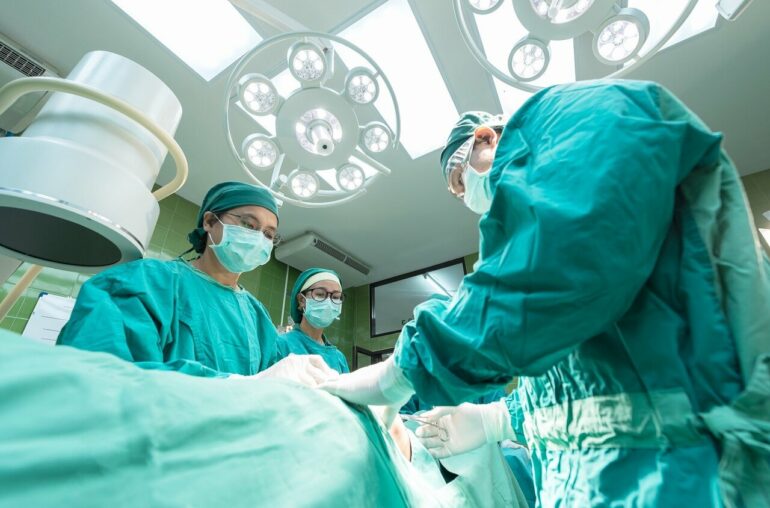Surgical care experts have unveiled two studies in The Lancet that will help to provide safer surgery for thousands of patients around the world—particularly in low- and middle-income countries (LMIC).
Researchers found that routinely changing gloves and instruments just before closing wounds could significantly reduce Surgical Site Infection (SSI)—the world’s most common post-operative complication. Secondly, they tested a new toolkit that can make hospitals better prepared for pandemics, heatwaves, winter pressures and natural disasters, which could reduce cancelations of planned procedures around the world.
Surgical infections
Patients in LMICs are disproportionately affected by wound infections, but following a trial of the procedure in Benin, Ghana, India, Mexico, Nigeria, Rwanda and South Africa, researchers found that a routine switch of gloves and instruments during abdominal wound closures could prevent as many as 1 in 8 cases of SSI.
Study co-author Aneel Bhangu from the University of Birmingham commented, “Surgical site infection is the world’s most common postoperative complication—a major burden for both patients and health systems. Our work demonstrates that routine change of gloves and instruments is not only deliverable around the world, but also reduced infections in a range of surgical settings. Taking this simple step could reduce SSIs by 13%—simply and cost-effectively.”
Patients who develop SSI experience pain, disability, poor healing with risk of wound breakdown, prolonged recovery times and psychological challenges. In health systems where patients have to pay for treatment, this can be a disaster and increases the risk of patients being plunged into poverty after their treatment. The simple and low-cost practice of changing gloves and instruments just before closing the wound is something that can be done by surgeons in any hospital around, meaning a huge potential impact.
Surgical preparedness index
Experts from the NIHR Global Research Health Unit on Global Surgery also unveiled their “Surgical Preparedness Index” (SPI) today in The Lancet—a key study assessing the extent to which hospitals around the world were able to continue elective surgery during COVID-19.
Researchers identified different features of hospitals that made them more or less “prepared” for times of increased pressure. They used COVID-19 as an important example, but highlighted that health systems are put under stress for all sorts of reasons each year—from seasonal pressures to natural disasters, and warfare. A team of clinicians from 32 countries designed the SPI, which scores hospitals based on their infrastructure, equipment, staff, and processes used to provide elective surgery. The higher the resulting SPI score, the more prepared a hospital is for disruptions.
After creating the SPI tool, the experts asked 4,714 clinicians in 1,632 hospitals across 119 countries to assess the preparedness of their local surgical department. Overall most hospitals around the world were poorly prepared, and suffered a big drop in the number of procedures they were able to provide during COVID-19. The team found that a 10-point increase in the SPI score corresponded to four more patients that had surgery per 100 patients on the waitlist.
Lead author James Glasbey from the University of Birmingham commented, “Our new tool will help hospitals internationally improve their preparation for external stresses ranging from pandemics to heatwaves, winter pressures and natural disasters. We believe it help hospitals to get through their waiting lists more quickly, and prevent further delays for patients. The tool can be completed easily by healthcare workers and managers working in any hospital worldwide—if used regularly, it could protect hospitals and patients against future disruptions.”
Professor Dion Morton, Barling Chair of Surgery at the University of Birmingham and Director of Clinical Research at the Royal College of Surgeons of England, commented, “Although not all post-operative deaths are avoidable, many can be prevented by increasing investment in research, staff training, equipment, and better hospital facilities. We must invest in improving the quality of surgery around the world.”
Dr. Sarah Puddicombe, Assistant Director for Global Health at NIHR Coordinating Centre, said, “This important study helps pave the way to make surgery significantly safer for thousands of patients around the world. It is just one of many exciting findings that are beginning to emerge from NIHR-funded Global Health Research Units, Groups and projects working with partners around the world. We are committed to research that contributes to the health and wealth of the nation and benefits people and communities globally.”
More information:
Routine sterile glove and instrument change at the time of abdominal wound closure to prevent surgical site infection: pragmatic, cluster randomised trial in seven low and middle income countries (ChEETAh), The Lancet (2022). www.thelancet.com/journals/lan … (22)01884-0/fulltext
Elective surgery system strengthening: development, measurement, and validation of the Surgical Preparedness Index (SPI) across 1,632 hospitals in 119 countries, The Lancet (2022). www.thelancet.com/journals/lan … (22)01846-3/fulltext
Provided by
University of Birmingham
Citation:
Experts pave the way for safer surgery to address global elective waiting lists (2022, October 31)



